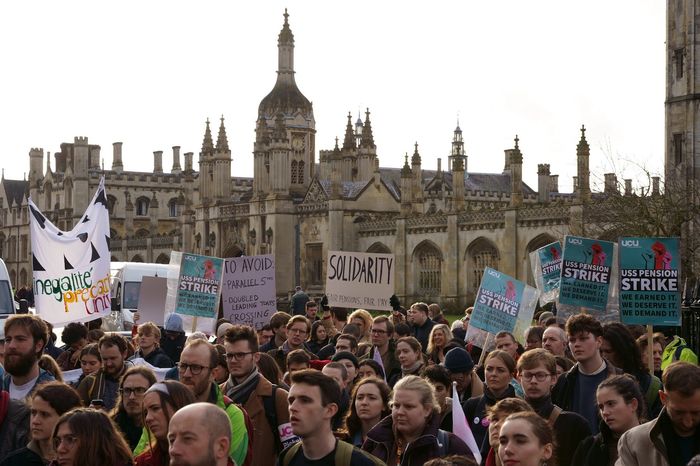UCU announces development in fight against casual contracts on first day of strikes
It has been announced that the University agreed to consider the transfer of non-fixed-term roles in November, as students and staff rally on King’s Parade

The first day of strikes in Cambridge has seen Cambridge UCU (CUCU) publicise progress made in November in the fight against casual contracts for hundreds of University staff.
CUCU announced earlier that the HR Committee at the University have agreed to consider the transfer of hourly paid teachers to employment contracts and a review of around 700 fixed-term contracts in roles in roles of an ongoing nature, to identify who could be transferred from fixed-term to open-ended roles.
This came after the approval of the minutes made at a meeting between CUCU and the University which took place in November 2019.
Lorena Gazzotti, Cambridge UCU anti-casualisation officer, said: “this is a huge win in our campaign to Raise the Bar for casualised staff at the University of Cambridge. A year ago none of this would have been possible.”
However, Ruth Lawlor, another anti-casualisation officer, added: “Although we have won this battle, more work is needed to win the fight. CUCU is still hard at work negotiating with the university on other parts of our claim… We need to make sure that University HR will not back down from their proposal.”
Around 50 to 60 people rallied outside Great St Mary’s Church on King’s Parade earlier this afternoon in solidarity with the University, and College Union (UCU) strikes which started today.
Spokespeople from UCU made speeches, including a reading of their manifesto, Why We Must Strike Now: “Striking means raising our voices to defend our pensions… Striking gives us strength in local negotiations… Striking means we have more power”.
Crowds shouted “shame” in response to speeches about the University’s “anti-democratic” decision making and chanted “Students and workers, unite and fight!” Strikers waved placards reading “The longer the picket, the shorter the strike”, with students from Christs’s College holding a banner saying “Christ’s Students Support Our Staff”.
Other picket lines were organised this morning at Downing Site, Old Schools, Sidgwick Site, West Cambridge, Faculty of Education, and Addenbrooke’s.
More than 30 people, made up of mostly staff and PhD students, made up picket lines by the English Faculty on Sidgwick Site.
Laura McCormick-Kilbride, who attended the picket lines at Sidgwick in Solidarity with striking workers, told Varsity that due to her position as a research fellow, she was not able to properly strike and was only able to take Action Short of Strike, which was “frustrating”.
She explained that those in the most precarious positions are the most vulnerable to issues like casualisation and unequal pay, but that they need their pay the most and so are unable to strike, creating “mixed feelings” on the picket lines.

Approximately 20 people also attended the picket line at Downing Site this morning, and pitched up banners reading “Our Pensions in Ruins” and “A Monumental Injustice”.
Gedis Lesutis, a postdoctoral fellow at the Downing picket line, said casualisation left people like him with no choice other than taking industrial action, “I studied in university for eight years, I have a PhD and everything, and I still can’t get a secure contract and a secure position in the University. I have to go from one short-term contract to another.”
He admitted the strikes are getting “emotionally harder and harder”, since the University has not made any “substantial, noticeable difference” to the lives of academics. But he remained optimistic because there was a good turnout at the picket and students are very supportive.
The strike action is centred on the sustainability of the Universities Superannuation Scheme (USS) and rising costs for its members, and on universities’ failure to make significant improvements on pay, equality, casualisation and workloads.
This round of strikes, which are planned to increase by one day each week over the next three weeks, until Friday 13th March, follows eight days of industrial actions last term, which centred on similar disputes.
UCU wrote online: “The pickets give staff the confidence to strike, place pressure on management, and provide an opportunity to explain to students why we’re taking action. Even if you are not part of the dispute please visit the pickets and show your support!”
 Music / The pipes are calling: the life of a Cambridge Organ Scholar25 April 2025
Music / The pipes are calling: the life of a Cambridge Organ Scholar25 April 2025 News / Candidates clash over Chancellorship25 April 2025
News / Candidates clash over Chancellorship25 April 2025 Interviews / Dr Ally Louks on going viral for all the wrong reasons25 April 2025
Interviews / Dr Ally Louks on going viral for all the wrong reasons25 April 2025 News / Cambridge professor paid over $1 million for FBI intel since 199125 April 2025
News / Cambridge professor paid over $1 million for FBI intel since 199125 April 2025 Comment / Cambridge builds up the housing crisis25 April 2025
Comment / Cambridge builds up the housing crisis25 April 2025







